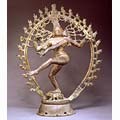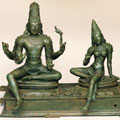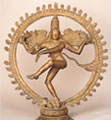 |
|
 |
 |
 |
 |
 |
 |
 |
 |
Bronze Sculpture of the Chola Period
The Cholas came to power in the late 9th century, and until the late 13th century, they ruled most of south India, Sri Lanka, the Maldive Islands, and even parts of the Indonesian island of Java from their homeland near Thanjavur (Tanjore) on the southeastern coast. They also maintained diplomatic ties with countries as distant as Burma (Myanmar), China, and Malaysia. Chola rulers were active patrons, and during their reign, poetry, drama, music, and dance flourished. They also constructed enormous stone temple complexes decorated inside and out with painted and sculpted representations of the Hindu gods. However, some of the best-known artistic remains from this time period are the bronzes that were commissioned for each temple. While the stone sculptures and the inner sanctum image empowering the temple remained immovable, changing religious concepts during the 10th century demanded that the deities take part in a variety of public roles similar to those of a human monarch. As a result, large bronze images were created to be carried outside the temple to participate in daily rituals, processions, and temple festivals. The round lugs and holes found on the bases of many of these sculptures are for the poles that were used to carry the heavy images. Admired for the sensuous depiction of the figure and the detailed treatment of their clothing and jewelry, Chola-period bronzes were created using the lost wax technique. Although bronze casting has a long history in south India, a much larger and a much greater number of bronze sculptures were cast during the Chola period than before, further attesting to the importance of bronze sculpture during this period. It should be noted that when in worship, these images are covered in silk cloths, garlands, and jewels, and would not appear as they do outside a religious context. Decorating the bronzes in this way is a tradition at least a thousand years old as such decorations are referred to in 10th-century Chola inscriptions. |
 |
 |
| 1 thru 12 of 15 next > |
 |
| view text only list |
 |

Buddha |
 |

Parvati |
 |

Shiva Nataraja |
 |

Parvati |
 |

Krishna Dancing on Kaliya |
 |

Rama |
 |

Saint Sambandar |
 |

Brahma |
 |

Ganesha |
 |

Saint Mannikkavachaka |
 |

Shiva and Parvati |
 |

Shiva Nataraja |
 |
|
 |